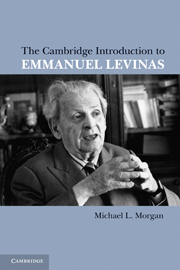Book contents
- Frontmatter
- Contents
- Preface
- Introduction
- 1 Responding to Atrocity in the Twentieth Century
- 2 How to Read Levinas: Normativity and Transcendental Philosophy
- 3 The Ethical Content of the Face-to-Face
- 4 Philosophy, Totality, and the Everyday
- 5 Subjectivity and the Self: Passivity and Freedom
- 6 God, Philosophy, and the Ground of the Ethical
- 7 Time, History, and Messianism
- 8 Greek and Hebrew: Religion, Ethics, and Judaism
- Conclusions, Puzzles, Problems
- Recommended Readings
- Index
7 - Time, History, and Messianism
Published online by Cambridge University Press: 05 June 2012
- Frontmatter
- Contents
- Preface
- Introduction
- 1 Responding to Atrocity in the Twentieth Century
- 2 How to Read Levinas: Normativity and Transcendental Philosophy
- 3 The Ethical Content of the Face-to-Face
- 4 Philosophy, Totality, and the Everyday
- 5 Subjectivity and the Self: Passivity and Freedom
- 6 God, Philosophy, and the Ground of the Ethical
- 7 Time, History, and Messianism
- 8 Greek and Hebrew: Religion, Ethics, and Judaism
- Conclusions, Puzzles, Problems
- Recommended Readings
- Index
Summary
Levinas's interest in time, temporality, and history was lifelong. He wrote about these themes early and throughout his career. They are one of the most difficult aspects of his thought to grasp, yet they are central to his philosophy. Especially given his orientation to these issues – against the background of European philosophical and theological treatments of time, history, messianism, and death – what he says may sound strange to the ears of Anglo-American philosophers. But these are important matters. In this chapter I will situate his treatment in the context of thinking about time during the period from the turn of the century through Weimar, follow the basic stages of his views about time, and then place the latter in the context of contemporary philosophical discussions of time and history. Without understanding Levinas's discussion of time, we would fail to appreciate fully what he says about ethics, religion, and politics.
THINKING ABOUT TIME
It is helpful to see the interest in time, at the turn of the century, as part of the debate concerning the Naturwissenschaften (natural sciences) and the Geisteswissenschaften (social sciences). In this context, time entered into questions of scientific method, of the nature of philosophy, of history and historical method, and of ethics, especially relativism and historicism. In his own way, Levinas reflects on issues in several of these areas; his thinking is part of the revival of Kantian philosophy.
- Type
- Chapter
- Information
- The Cambridge Introduction to Emmanuel Levinas , pp. 161 - 182Publisher: Cambridge University PressPrint publication year: 2011



